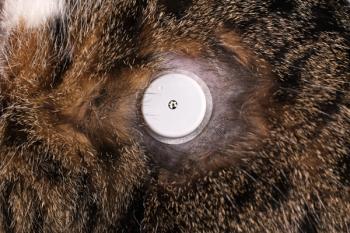
Interpreting thyroid function tests
Q. How does one interpret the current thyroid function tests in dogs?
Q. How does one interpret the current thyroid function tests in dogs?
A. Drs. Duncan Ferguson; Peter Graham; Peter Kintzer; Richard Nelson and David Panciera at the 21st American College of Veterinary Internal Medicine Forum in Charlotte, N.C., gave a consensus lecture on diagnosis and treatment of hypothyroidism in dogs. Some relevant points in this lecture are provided below.
In 2002, the Society for Comparative Endocrinology was asked by ACVIM for a group of its members (the authors) to draft a consensus statement on recommendations for tests for the diagnosis of hypothyroidism in the dog. A preliminary report was prepared for the ACVIM Forum plenary session in 2002.
Since that time, the Society for Comparative Endocrinology members have had the opportunity to review the recommendations and make suggestions for modifications and additions. The following information summarizes the key points associated with this consensus statement of early 2003.
First, readers should realize that thyroid diagnostic tests do not always lead to a "yes" or "no" answer. Early stages of thyroid dysfunction may often be associated with discordant or confusing results. Furthermore, although not widely available, the ideal is to interpret laboratory tests against breed-specific normal ranges, particularly in the sight hounds, where serum total and free T4 can be much lower than in other breeds.
The diagnostic value of thyroid function tests will be enhanced when they are used to confirm a veterinarian's suspicion of thyroid dysfunction and based on the case history, clinical signs and other general diagnostic tests. Careful consideration of the choice and timing of tests results from full consideration of the potential complicating factors such as drug therapy or nonthyroidal illness (NTI). Irrespective of the dog's organ system(s) apparently involved on clinical presentation, hypothyroidism is a multisystemic disorder, and all cases merit a general diagnostic workup including CBC, serum chemistry profile and urinalysis.
The primary use of the current canine TSH assay would be to use it as a screening test for hypothyroidism. However, a TSH test with approaching 100 percent sensitivity would be required. There are many questions about the diagnostic sensitivity of the current TSH assay because about one-fourth of hypothyroid dogs having normal TSH values. Recently, pulsatile release of TSH has been confirmed in hypothyroid but not euthyroid dogs. A TSH result does add specificity to the observation of a low T4 or free T4 determination.
Serum thyrotropin (TSH)
If you seek to detect virtually all (99+ percent) of the cases - do total T4, TSH and free T4 by equilibrium dialysis.
Screening for hypothyroidism
If you seek to detect most of the time (98.5 percent) regardless of the underlying pathology - do total T4 and TSH, or free T4 by equilibrium dialysis or TSH, or total T4 and anti-T4 autoantibodies.
If you want to use only total T4 - a normal value will preclude hypothyroidism in 90 percent of cases assuming a validated laboratory-based immunoassay for total T4 is used.
If you want to screen for subclinical forms of thyroid failure or heritable thyroiditis - do total T4, TSH, +/- (free T4 by equilibrium dialysis or anti-T4 autoantibodies), and anti-thyroglobulin autoantibodies. The Orthopedic Foundation of America developed an annual certification process for screening against hypothyroidism, and the tests include free T4 by equilibrium dialysis, TSH and anti-thyroglobulin autoantibodies. Anti-thyroglobulin autoantibodies are used to screen for the heritable condition of lymphocytic thyroiditis.
Age and breed normal ranges should be developed because sight hounds tend to have total T4 and free T4 by equilibrium dialysis values much lower than other breeds.
If there is concurrent NTI or confounding drugs: free T4 by equilibrium dialysis and TSH +/- anti-thyroglobulin autoantibodies are preferred.
It is uncommon that animals die from untreated hypothyroidism. Ideally, the veterinarian should pursue diagnostics after managing NTI. The total T4 falls with increasing severity of the NTI, making it a prognostic factor. Free T4 by equilibrium dialysis remains normal in a larger percentage of NTI cases.
Common drugs with known effects on canine thyroid function:
Drugs to consider
- Glucocorticoids: high dosages, chronic therapy - total T4 falls, free T4 by equilibrium dialysis more resistant, TSH is unchanged or decreased.
- Sulfonamides: chronic therapy may cause reversible hypothyroidism.
- Phenobarbital: chronic therapy cause mild fall in total T4 and free T4 by equilibrium dialysis; TSH remains normal in most dogs, but rises in a small percentage.
- Carprofen: total T4 mild fall, free T4 by equilibrium dialysis is normal.
- Clomipramine: mild fall in total T4 and free T4 by equilibrium dialysis; TSH remains normal.
Discordant results of total T4 or free T4 by equilibrium dialysis with TSH and anti-thyroglobulin autoantibodies may reflect intermediate stages of thyroid pathology, such as progressive development autoimmune thyroiditis. One of the most common situations is the observation of a normal TSH in face of low total T4 or free T4 by equilibrium dialysis. It should be recognized that a significant proportion (15-25 percent) of hypothyroid dogs may have a normal TSH. Also, normal TSH with "low" total T4 or free T4 by equilibrium dialysis may be associated with the sight hound breeds. In these dogs, in euthyroidism, total T3 is often in the normal range.
Dealing with discordant results
In some cases, diagnostic tests are equivocal, and it may make sense to proceed to do a therapeutic trial with L-thyroxine therapy. However, it is important to recognize that a positive clinical response to L-thyroxine treatment is a crucial confirmation of abnormal diagnostic tests. Therapeutic trials should be considered only when clinical signs are supportive, when there are no other significant illnesses that might be treated successfully before retesting, and only if there is a clinical sign or lesion that can be monitored objectively during therapy.
Treatment response
A therapeutic trial should be considered only if there is one of the following results in diagnostic testing:
- low total T4,
- normal total T4 and positive anti-T4 autoantibodies.
- normal total T4 and high TSH.
Of course, the strongest evidence is gained by the observation of a response to L-thyroxine and then a relapse when the medication is removed. However, the veterinarian should be aware that there may also be pharmacological effects of L-thyroxine, i.e., a "T4-responsive" condition even in dogs with no diagnostic evidence of hypothyroidism. Conditions shown specifically to be T4-responsive include poor coat quality, seasonal flank alopecia and polyneuropathies.
The most utilitarian set of thyroid diagnostic tests include the following:
Normal free T4 by equilibrium dialysis and TSH almost always identify a euthyroid animal.
A low total T4 or free T4 by equilibrium dialysis together with a high TSH confirms hypothyroidism in most cases.
Demonstration of positive anti-thyroglobulin autoantibodies is most valuable to support abnormal total T4, free T4 by equilibrium dialysis and/or TSH. When other tests are normal, its predictive value in a given dog remains to be determined.
A low total T3 is probably only of diagnostic value to support the diagnosis of hypothyroidism in sight hounds.
Newsletter
From exam room tips to practice management insights, get trusted veterinary news delivered straight to your inbox—subscribe to dvm360.





